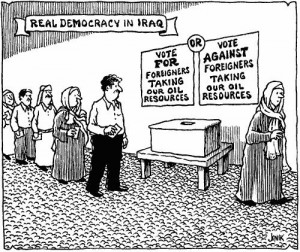In his now classic book, Capitalism, Socialism and Democracy, Joseph A Schumpeter, espouses what may be deemed an “elitist” model of participatory democracy. For Schumpeter, the incapacity of the common man to make intelligent decisions in areas of politics makes it necessary to limit the role of the general populace to the voting process: leaving actual rule to an elite minority.
In many ways, Schumpeter’s argument is sound. He makes a valid point that there is “ no such thing as a uniquely determined common good that all people could agree on or be made to agree on by the force of rational argument(251). Nor can equal satisfaction be gained in such a situation. He points out that in many situations the support of the people may be present despite a notable lack of democracy- the populist regimes of Latin America come to mind(255). Moreover, he argues that “the will of the people is the product and not the motive power of the political process”(p262). Popular opinion is, in reality, easily manipulated or manufactured(p263).
Critics may argue that Schumpeter, while pointing to clear problems within the democratic process– many of which hold more relevance now than ever– fails to address the underlying problem of elite rule and the question of who exactly is creating popular hegemony. Even so, Schumpeter’s minimalist model of democracy, as I understand it, remains popular as a democratic model and relevant within contemporary statecraft. This is not to say that the democratic quality of this model is uniform across the globe, but, rather that the strength of emerging and established democracies is, rather, dependent on other conditions aside from strictly participatory election.
Crucially, democracy can not be reduced to a one-dimensional act of approving or refusing the men chosen to rule, but, must also reflect freedom, to assemble and voice dissent, judicial independence, division of military and state, and transparency among other things. Each of these may be seen as a counter-measure to balance the manufacture of popular opinion or hegemony.

